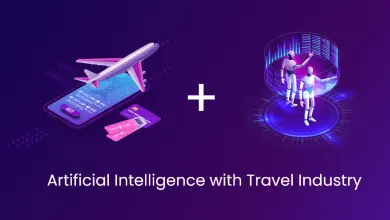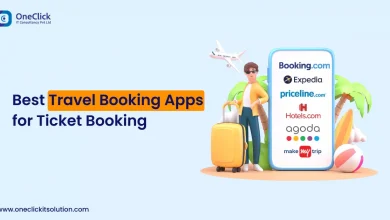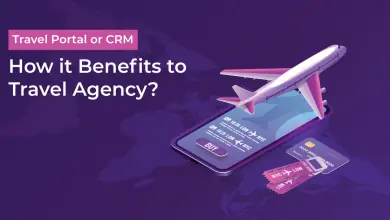How much does it cost to Develop Cruise Booking Engine
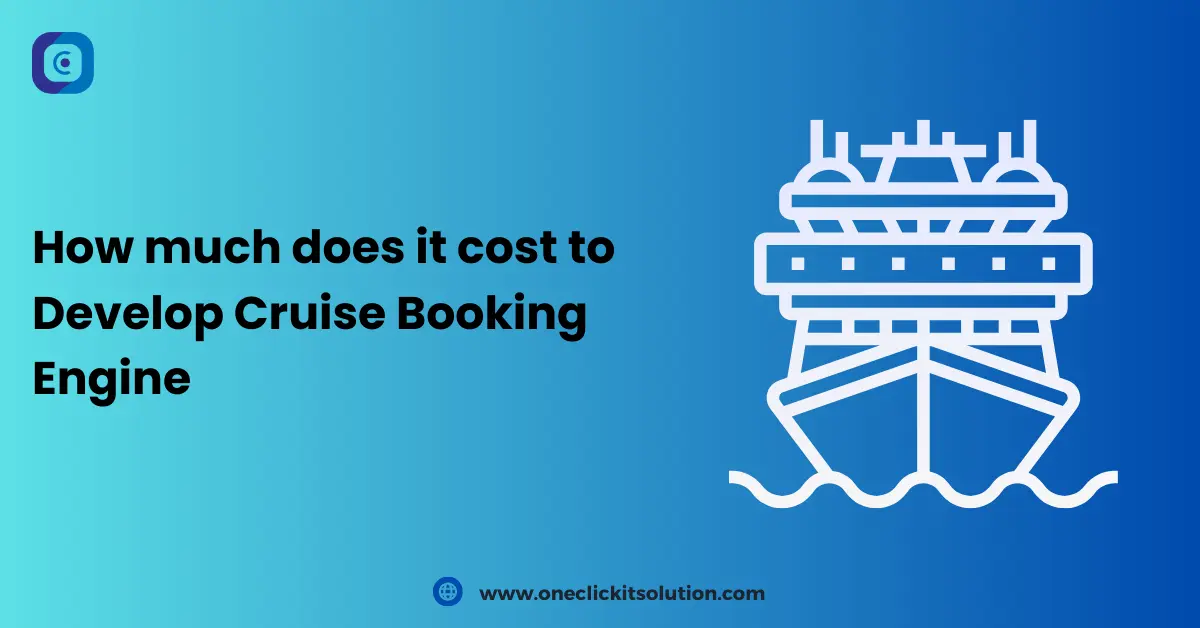
Introduction
The cruise industry is setting sail full steam ahead! With passenger numbers and revenue soaring, it’s no surprise that cruise booking engines are becoming essential tools in the travel sector.
Here’s where cruise booking engine development comes in. It’s your chance to catch the wave and offer a convenient, user-friendly platform for travelers to book their dream cruises.
Here’s why a cruise booking engine might be the perfect digital anchor for your business:
1. A Booming Market:
- In 2022 alone, the cruise industry generated nearly $19 billion, bouncing back strongly from the pandemic. This upward trend shows no signs of slowing down, with passenger numbers steadily increasing.
- The number of people taking ocean cruises keeps climbing, with no signs of slowing down (20.4 million passengers in 2022 alone!).
2. Enhanced Profits & Efficiency:
- By offering a user-friendly and efficient booking experience, you can capture a share of this growing market and boost your bottom line.
- Think faster bookings, happier customers, and increased revenue. It’s a win-win situation!
3. Adaptability & Innovation:
- The industry has proven to be adaptable and resilient, even in the face of challenges.
- By investing in a cruise booking engine, you can align your business with a responsible and forward-thinking industry.
As evident from the above statistics, it’s clear that more and more people are discovering the joy of ocean travel, pushing the industry towards record-breaking numbers. This surge in popularity highlights the promising potential of cruise booking engines in the forthcoming years.
In this blog post, we’ll explore the world of cruise booking engines. We’ll cover the essential features, the underlying technology, and a breakdown of the costs involved. Let’s get started.
Cruise Booking Engine: A Comprehensive Overview
Can you imagine a system that streamlines your cruise booking process, attracts new customers, and boosts your sales? That’s the magic of a cruise booking engine! Let’s understand how it works:
1. Real-Time Inventory & Availability:
- The API integration allows your business to query live, real-time information about cruise availability. Think of it as a digital bridge connecting you with cruise suppliers.
- An API (Application Programming Interface) acts as the interpreter, allowing you to access live inventory and availability in real-time.
- This means you can offer your customers accurate information on available cruises, cabins, and pricing, all within your own booking system.
2. Dynamic Packaging:
- We know your customers want more than just a cruise. Once your customer selects a cruise, the real magic of the cruise booking engine comes into play.
- The dynamic packaging solution empowers you to create customized travel packages that bundle your cruise with flights, hotels, and even transfers.
- You can enhance their experience by offering additional travel components such as flights, hotels, and transfers. This not only adds value but also customizes the travel experience to meet the unique needs and preferences of your customers.
3. You Can Build Your Own Cruise Offerings:
- You can curate bespoke cruise packages by hand-picking elements that align with your brand and customer expectations, creating unique cruise experiences that stand out.
- You’re not limited to predefined packages. Hand-pick the components (cruises, destinations, add-ons) and design your own unique offerings.
- This allows you to stand out from the competition and attract customers seeking personalized experiences.
4. Streamline & Sell More:
- A cruise booking engine is more than just a booking tool. It’s a business booster.
- Automate time-consuming tasks like searching for availability and processing bookings.
- Sell through multiple channels (website, mobile app, etc.) and reach a wider audience.
- 24/7 online booking allows customers to browse and book at their convenience, day or night.
A cruise booking engine is like your personal cruise sales assistant, working online. It offers the technology you need to manage your inventory, create special deals, and make it easier to sell cruises through various channels, ultimately growing your business.

Breaking Down the Basics: Cruise Engine Essential Features
Let’s understand the nitty-gritty of what makes a cruise booking engine not just functional but truly indispensable for your business. Here are the core features in a cruise booking engine that can make a world of difference:
1. Multi-Currency and Multi-Language Support
Is it possible to cater to a global audience with remarkable ease? Your cruise booking engine does just that by supporting multiple currencies and languages. This means no matter where your customers are or what language they speak, they can easily explore your platform. It’s about breaking down barriers and making your services accessible to a worldwide audience, ensuring everyone feels welcome and understood.
2. Real-Time Availability and Pricing
In a world where timing is everything, your engine’s ability to integrate real-time data for availability and pricing is a game-changer. It allows customers to make informed decisions on the fly, securing their bookings without the frustration of outdated information. This transparency builds trust and satisfaction, two key ingredients for customer loyalty.
3. Customizable Search Filters
Your customers have unique preferences, and your booking engine acknowledges that by offering customizable search filters. Whether it’s by destination, cruise line, cabin type, or onboard amenities, your customers can tailor their search to find exactly what they’re looking for. This personal touch not only enhances the user experience but also increases the likelihood of conversions.
4. Secure Payment Gateway Integration
Trust is paramount in the digital world, and with secure payment gateway integration, your booking engine safeguards every transaction. This security feature ensures that customers feel confident and safe when making payments, a crucial step in maintaining a positive reputation and encouraging repeat business.
5. Mobile Responsiveness
With the shift towards mobile-first browsing, a mobile-responsive design is not just an option; it’s a necessity. Your cruise booking engine’s ability to adapt seamlessly to any device means that customers can book their next adventure wherever they are, without any hiccups. It’s about being accessible at the right place and the right time.
6. Itinerary Management
Offering customers the ability to view, customize, and manage their itineraries directly within the booking engine not only puts control in their hands but also elevates their planning experience. It’s a feature that adds value by making trip organization effortless and personalized.
7. Integration with CRM and Marketing Tools
Finally, integrating your booking engine with CRM and marketing tools can transform how you interact with your customers. This connection allows for targeted communication, better understanding of booking trends, and personalized marketing campaigns. It’s about creating meaningful relationships and driving growth through smart data use.
The Tech Behind the Scenes: Building a Superior Booking Engine
Building a superior cruise booking engine goes beyond just functionalities – it’s about selecting the right technology under the hood. This technology stack plays a crucial role in your engine’s performance, scalability, and user experience. Let’s explore the key components:
1. Front-End Development: The Face of Your Booking Engine
Why It Matters: The front-end is what your users interact with. Utilizing cutting-edge technologies like React or Angular gives your booking engine a sleek, responsive interface that works smoothly across all devices.
The Impact: Imagine your booking engine as a high-performance sports car. React or Angular is the aerodynamic design that cuts through the air effortlessly – it’s what makes the user experience so seamless and engaging.
2. Back-End Development: The Engine Under the Hood
Powering Your Platform: Choosing robust frameworks like Node.js or Django for the back-end is like picking a powerful engine for that sports car. They ensure your booking engine runs efficiently, handling all the server-side tasks and data processing without breaking a sweat.
Real-World Benefits: This means whether your customers are browsing deals or booking a dream cruise, everything happens in real-time, with no delays or hiccups.
3. Database Management: The Data Warehouse
Storing the Essentials: A reliable and scalable database solution, such as MongoDB or PostgreSQL, acts as the warehouse where all your booking engine’s data is stored securely and organized efficiently.
Why It’s Crucial: Just like a well-organized warehouse speeds up order processing, a good database ensures quick access to cruise itineraries, pricing, and customer info, making your platform incredibly responsive.
4. Cloud Infrastructure: The Foundation
Scalability and Security: Adopting cloud infrastructure providers like AWS or Azure offers a solid foundation that’s both secure and scalable. It’s like having an expandable warehouse that only you have the key to, ready to accommodate peak seasons without a hitch.
The Advantages: This flexibility ensures your booking engine remains online and responsive, no matter how many customers are planning their next cruise adventure at the same time.
5. API Integration: The Universal Connector
Enhancing Functionality: Seamlessly integrating with third-party APIs for cruise line inventory, payment gateways, and more, is like adding satellite navigation, in-car entertainment, and advanced safety features to that sports car – it enhances the journey, providing real-time information and added functionalities.
6. Security Measures: The Safety Gear
Protecting Your Passengers: Implementing top-notch security measures, including SSL encryption and data encryption, ensures that your customers’ sensitive information is always protected. Think of it as the seatbelts, airbags, and advanced driver-assistance systems that keep everyone safe on the road.
The Essential Role of API Integration in Cruise Booking
Let’s break down how API integration is like adding a turbo boost to your cruise booking engine, making it super user-friendly and competitive.
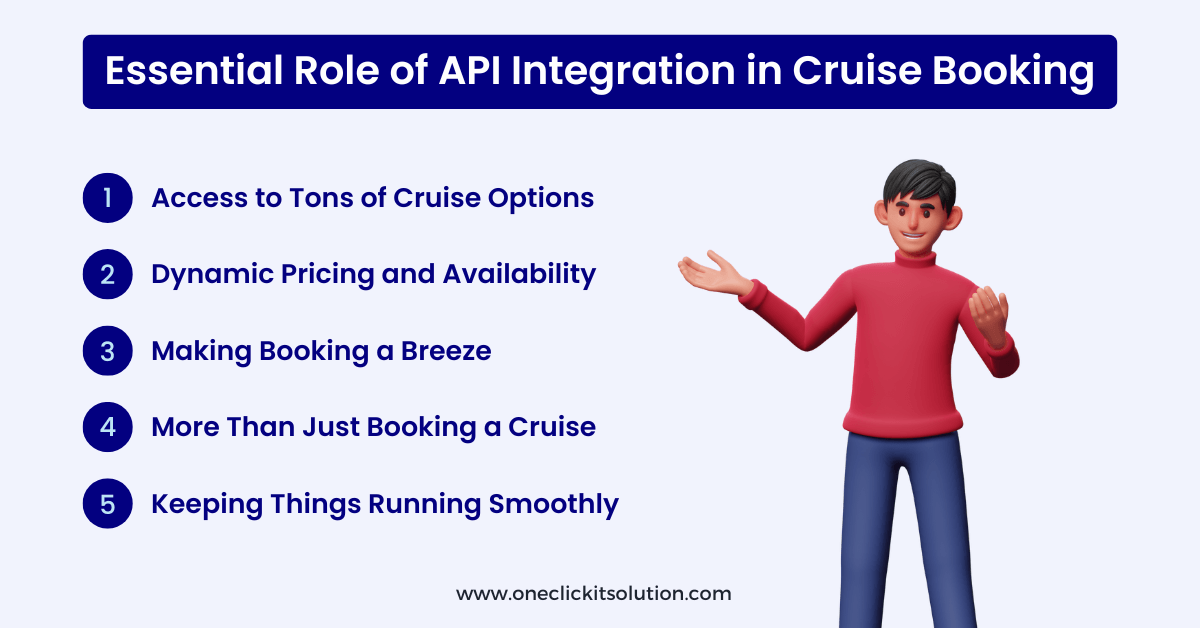
1. Access to Tons of Cruise Options
What’s Cool About It: Imagine being able to offer your customers every cruise option under the sun, from the luxury liners to the adventure cruises, all in one place. That’s what API does. It hooks your platform up with a bunch of cruise lines and travel suppliers, so your customers have loads to choose from.
Why You’ll Love It: More choices mean happier customers, and happier customers mean more bookings and loyalty to your platform. It’s a win-win!
2. Dynamic Pricing and Availability
Real-Time Agility: The travel industry’s pricing and availability can change in the blink of an eye. API integration ensures that your booking engine stays ahead of the curve, offering real-time updates that reflect the most accurate cruise options and packages available.
The Perk: This keeps your customers from getting frustrated by outdated info and shows them you’re on top of your game.
3. Making Booking a Breeze
The Scoop: Nobody likes a complicated booking process. API makes everything smoother by automating data transfers and bookings, cutting down on manual work and mistakes.
The Benefit: A hassle-free booking process means customers are more likely to book with you again. It’s like having a super-efficient concierge who’s always got your back.
4. More Than Just Booking a Cruise
The Extra Mile: API lets you offer your customers the whole package – not just the cruise, but also extra goodies like excursions, special onboard activities, and even hotel stays.
Why It’s Awesome: It’s all about giving your customers an amazing experience from start to finish, making your platform the go-to place for all things cruise.
5. Keeping Things Running Smoothly
Cutting-Edge Efficiency: The automation and data synchronization provided by API integration mean your team can focus on what they do best – innovating and enhancing the customer experience, rather than getting bogged down by manual data entry and updates.
Long-Term Benefits: This operational efficiency not only optimizes resources but also ensures your booking engine is always synchronized with the latest offerings, keeping your platform competitive and relevant.
So, in simpler terms, API integration is like giving your cruise booking engine a major upgrade. It makes everything faster, easier, and more reliable, which is exactly what your customers are looking for.

The Financial Blueprint of Cruise Booking Engine Development
Let’s talk about what goes into the budget for making a cruise booking engine, kind of like planning a big party but for techies. We’ll look at all the pieces of the puzzle, from figuring out what your customers want to keeping things running smoothly after launch.
1. Starting Off: Market Research
Think of this as your party planning phase. You’re figuring out what your guests (in this case, customers) like, what other parties (competitors) are offering, and what’s trending. This step decides a lot of your next moves and how much you’ll need to spend to make your booking engine stand out.
Purpose: Understanding customer needs, market trends, and competitors.
- Customer Preferences: Identify what features and services customers value most.
- Competitive Analysis: Study competitors to find gaps and opportunities.
- Trend Identification: Stay ahead by integrating the latest technological trends.
Cost Variables: WOuld vary based on research depth and methods used.
2. Design: Making It Look Good
This is where you create the look and feel of your booking engine. Think of it as the shop’s window display. You want it to be clear, attractive, and easy to navigate. You can choose from pre-made designs (templates) or create a custom one from scratch. Remember, a good design is an investment that can lead to more bookings, so don’t skimp here!
Objective: Creating an intuitive and visually appealing user interface.
- User Experience (UX): Ensure the site is easy to navigate and user-friendly.
- Brand Alignment: Design should reflect your company’s branding and ethos.
Investment Range: Costs would fluctuate between choosing template designs and custom designs.
3. Development: The Building Block
Here’s where the heavy lifting happens. You’re putting together all the features, making sure they play nice with the tech you’ve chosen, and plugging into APIs for real-time cruise info. Whether it’s the look on the front end or the engine in the back, costs vary based on how complex and tech-savvy you want to get.
Main Task: Building the booking engine with necessary features and functionality.
- Front-End Development: Focus on how the booking engine looks and feels to the user.
- Back-End Development: Develop the server-side functionality that powers the engine.
- API Integration: Connect with external systems for real-time data on cruises.
Complexity and Costs: Would be Influence by the chosen tech stack and feature complexity.
4. Testing: No Bugs Allowed
Before you launch, you’ve got to make sure everything works flawlessly. This step is like the final walkthrough before the party starts. You’re checking for bugs and making sure the user experience is smooth. It’s a mix of automated tests and real people poking around to find any glitches.
Goal: Ensuring the booking engine operates smoothly without any bugs.
- Automated Testing: Use software tools to test for bugs and performance issues.
- Manual Testing: Have real users test for usability and experience quality.
Quality Assurance: Critical for a reliable and trustworthy booking engine.
5. Marketing: Spreading the Word
Once your engine is ready, it’s time to raise the sails and let the world know! This involves marketing strategies like SEO (search engine optimization), creating engaging content, or even running ads. The cost depends on the chosen tactics, but it’s all about getting people to notice your amazing new booking engine.
Purpose: To promote the booking engine and attract users.
- SEO: Optimize content for search engines to increase visibility.
- Content Marketing: Use blogs, videos, and social media to engage potential customers.
- Paid Advertising: Invest in ads to directly target your audience.
Strategy Costs: Will depend on the scope and scale of marketing campaigns.
6. Maintenance: Keeping It Running
Your site’s live, but you’re not done. Just like a car needs regular tune-ups, your booking engine will need some TLC to keep it running smoothly. This includes things like updates, security patches, and maybe even adding some cool new features down the line. It’s an ongoing investment to keep your engine ship-shape for the long haul.
Ongoing Requirement: Keeping the engine up-to-date and running smoothly.
- Updates: Regularly update software to include new features or security patches.
- Security: Implement measures to protect user data and transactions.
- Expansion: Add new functionalities or integrations as needed.
Recurring Costs: Maintenance is an ongoing expense necessary for long-term success.
Tech Partner Selection: Balancing Expertise, Experience, and Service
Don’t be fooled by the “cheap cruise” mentality when choosing a development partner for your booking engine. It’s not just about the price tag, it’s about someone who understands your vision and helps you set sail for long-term success. Here are some tips to help you chart your course and find the perfect fit!
1. Expertise and Experience
- Cruise Line Savvy: Look for a provider with a proven track record of developing successful cruise booking engines. OneClick IT Consultancy, for example, boasts extensive experience in the travel industry and understands the unique needs of cruise line integrations and bookings.
- Tech Stack Mastery: Ensure your chosen provider has expertise in the specific technologies you need, from back-end frameworks like Ruby on Rails to front-end magic like ReactJS and cloud platforms like AWS.
2. Alignment with Your Business Needs
- Customization Prowess: Your engine should be a tailor-made vessel, not a one-size-fits-all dinghy. Choose a provider who listens to your vision and can customize the development process to meet your specific requirements, budget, and target audience.
- Scalability and Growth: Don’t settle for a provider who can’t accommodate your future ambitions. Look for a partner who can scale your engine alongside your business growth, ensuring it remains agile and adaptable.
3. Communication and Customer Service
- Open Seas of Communication: Clear and consistent communication is essential. Choose a provider who values transparency, keeps you informed throughout the development process, and readily addresses your concerns.
- Long-Term Support: Building a cruise booking engine is a marathon, not a sprint. Opt for a provider who offers ongoing support and maintenance, ensuring your engine stays shipshape and continues to deliver value.
4. Transparency and Cost Considerations
- Hidden Reefs of Costs: Avoid murky waters of hidden fees. Choose a provider with clear pricing models, detailed project cost estimates, and a commitment to staying within budget.
- Value Beyond Price: Don’t solely chase the cheapest option. Focus on the provider offering the best value proposition, considering factors like expertise, experience, and long-term ROI.
Looking for cruise booking engine experts? Look no further than OneClick IT Consultancy!
OneClick IT Consultancy ticks all the boxes. We combine our deep understanding of the travel industry with cutting-edge technology to create custom-built booking engines. We prioritize scalability, so your engine can grow with your business, and open communication, so you’re always in the loop.
OneClick’s Cruise Booking Solution USPs
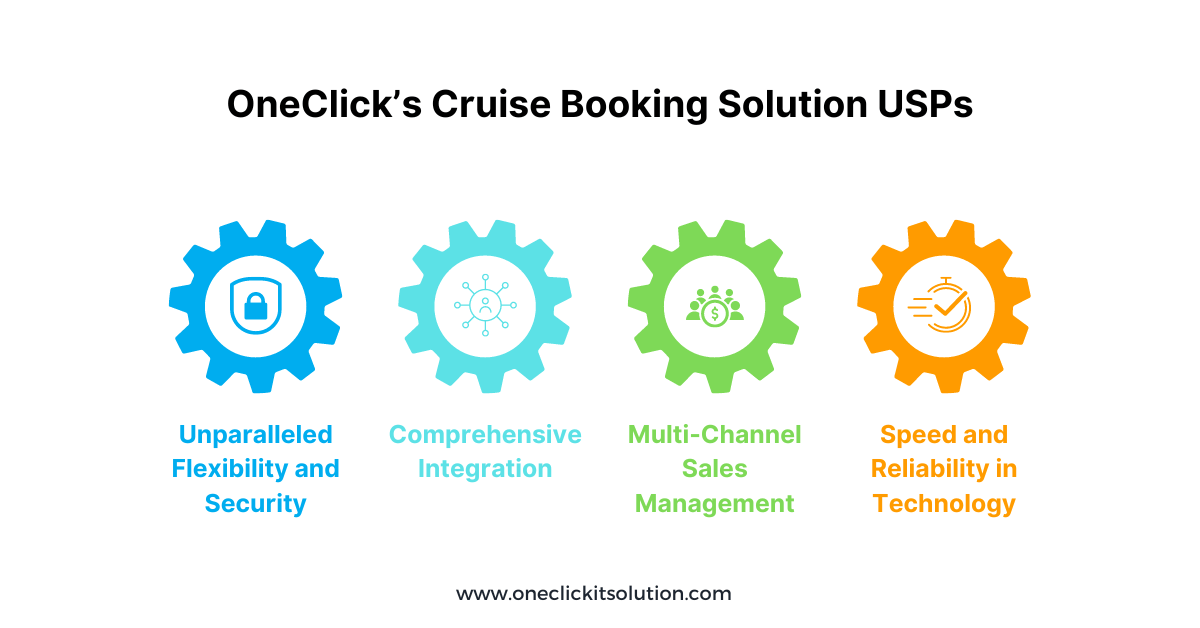
1. Unparalleled Flexibility and Security
Modular Design: Unlike a rigid, one-size-fits-all solution, our system is modular. This means it’s built with interchangeable components, allowing us to customize it perfectly to your unique business requirements.
- Think of it as building blocks. You choose the specific features and functionalities that perfectly align with your unique business needs and goals.
Cloud-Based Platform: Ditch the expensive and cumbersome on-site infrastructure. Our engine operates entirely on the secure and reliable cloud, offering several advantages:
- 24/7 Accessibility: Your team can access and manage bookings from anywhere, anytime, on any device with an internet connection.
- Streamlined Operations: Eliminate the need for complex infrastructure setup and maintenance, saving you time and resources.
- Enhanced Security: Benefit from robust cloud-based security measures to protect your data and customer information.
2. Comprehensive Integration
Customer Satisfaction at its Best
- Go beyond just cruises: Our all-in-one packaging feature allows you to seamlessly bundle cruises with flights, hotels, and even ancillary services (like shore excursions or onboard activities).
- Create compelling travel packages: This allows you to offer customers complete and attractive vacation experiences, catering to their diverse needs and desires.
- Boost customer satisfaction: By providing everything in one place, you simplify the booking process and increase customer satisfaction: a win-win for everyone!
Portfolio Synergy
- Experience unmatched cohesion: Our platform integrates seamlessly with our entire suite of products, including advanced cruise and tour modules.
- Centralized administration: This integration centralizes administrative functions across your customer-facing portal and agent-facing tools.
- Streamline operations: This reduces redundancy and saves you valuable time and resources, allowing you to focus on what matters most – selling more cruises!
3. Multi-Channel Sales Management
Versatile Solutions
- One System, Endless Possibilities: Ditch the hassle of juggling multiple platforms. Our versatile application lets you manage all your sales channels (website, mobile app, third-party platforms) from a single, intuitive interface.
- Scalability Made Simple: As your business grows, so do your needs. Our system is designed to scale effortlessly, allowing you to add new users and integrate with affiliated websites with ease.
B2B & B2C Flexibility
- Empowering Your Partners: Do you work with travel agents or other businesses? OneClick’s engine is built for B2B (business-to-business) transactions. Agents can access your offerings and seamlessly book cruises for their clients, streamlining the process for everyone.
- Direct-to-Consumer Convenience: Today’s travelers crave simplicity. B2C (business-to-consumer) functionality allows customers to book cruises directly through your platform, offering a convenient and personalized experience.
4. Speed and Reliability in Technology
Speed Matters:
- No more lag: Our cutting-edge technology ensures lightning-fast searches and booking processes.
- Happy customers: Say goodbye to frustrated customers waiting for pages to load. OneClick delivers a smooth and speedy booking experience, boosting customer satisfaction and conversions.
- More time for you: Our efficient technology frees up your valuable time and resources. Focus on what matters – growing your business – while OneClick handles the heavy lifting.
Reliability You Can Trust:
- Always available: You need a booking engine you can count on, 24/7. OneClick delivers unwavering reliability, ensuring your platform is always up and running for your customers.
- Boost your brand image: A reliable booking engine builds trust and confidence with your customers, leading to increased brand loyalty.

Why Choose OneClick for Your Cruise Booking Engine Development?
Finding the perfect crew to create your cruise booking engine can be tricky. You need experts who get it, are dedicated, and can customize everything to your needs. That’s where OneClick IT Consultancy comes in – we’re ready to captain your project!
1. Unmatched Expertise and Experience
We’ve weathered countless digital storms, having successfully developed and deployed cruise booking engines for clients worldwide. Our seasoned team, brimming with cruise industry knowledge and technical prowess, ensures your engine rides the waves with confidence.
2. Tailored Solutions, Not Cookie-Cutter Voyages
We craft bespoke engines, not one-size-fits-all blueprints. Each project is carefully designed to match your unique needs, business goals, and target audience. Whether you cater to luxury cruises or budget-friendly adventures, we’ll build an engine that resonates with your clientele.
3. Collaborative Approach: Your Vision, Our Expertise
We believe in partnership, not dictation. Your vision guides our sails, while our expertise refines the course. We collaborate closely with you, ensuring seamless communication, regular updates, and a development process that feels open and transparent.
4. Customization at Every Turn
From intuitive search filters to personalized package options, we empower you to customize your engine to perfection. Our flexible platform allows you to add unique features, integrate with desired third-party systems, and craft an experience that truly distinguishes your brand.
5. Post-Deployment Support: Your Ongoing Compass
We don’t simply hand you the helm and wave goodbye. Our dedicated team offers comprehensive post-deployment support, including maintenance, security updates, and optimization strategies. We’re always here to ensure your engine thrives in the ever-evolving digital seas.
6. OneClick Advantage: More Than Just Technology
With OneClick, you gain access to a network of travel industry partners, marketing expertise, and ongoing business insights. We go beyond mere development, empowering you with strategies to attract customers, convert bookings, and maximize your return on investment.
Are you prepared to initiate your cruise booking engine venture? Don’t wait any longer! Contact OneClick IT Consultancy today. Our experts are here to answer your questions, tailor a plan just for you, and map out a successful journey to a thriving online business.
OneClick’s Pricing Structure
Thinking about giving your travel services a digital boost with a cruise booking engine? Let’s talk numbers and options with OneClick, making sure it fits just right with what your business needs and can afford.
1. Whitelabel Solution: Easy and Quick
If you’re in a hurry to get things rolling and want your brand to shine through without much fuss, our Whitelabel solution is your go-to.
One-Time Setup Cost: This is between $4,250 and $4,700. It’s for tweaking our ready-made system to look and feel just like it’s yours. We split this cost into two payments over the first month to make it easier on your wallet.
Monthly Subscription Charges: These fees keep you connected to our cutting-edge system, and we’ve got a few options depending on how long you’re with us:
- $2,200/month if you’re in for 3 months
- $2,050/month for a 6-month stay
- $1,950/month if you’re committing to a whole year
How Long It’ll Take: It’ll take us about 5 to 6 weeks to get everything looking just right, including adding in Korean language support if you need it.
2. Custom Portal Development (B2C): Totally Yours
Looking for something totally unique that screams your brand? Our custom portal development has got you covered.
Website Development Cost: This will set you back $17,750. We’ll build a website from scratch, tailored to your brand, and hook it up with up to 2 SUPPLIER APIs for Hotels and Flights. The payment is split into four parts, so it’s easier to manage.
How Long It’ll Take: From design approval to launch, the process will take approximately 12 to 15 weeks, a small investment in time for a platform that fits your brand like a glove and is integrated with two supplier APIs of your choice for hotels and flights.
Whether you’re leaning towards a quick setup with our White Label option or going all out with a custom-built portal, we’re here to make it happen. Each choice is designed to fit your business like a glove – considering your growth, brand vibe, and how much you want to spend.


